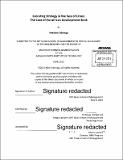Executing strategy in the face of crises : the case of the African Development Bank
Author(s)
Odunuga, Morisola
DownloadFull printable version (5.029Mb)
Other Contributors
Sloan School of Management.
Advisor
Donald Sull.
Terms of use
Metadata
Show full item recordAbstract
Several research studies on strategy execution have examined corporate establishments with hierarchical organizational structures. These organizations often have refined goals of effectively generating revenue and maximizing shareholder value. Absent from the literature, however, are effective means to manage multiple stakeholders institutions with complex structures and strong political influences. This paper fills this void by examining how the African Development Bank Group (AfB) developed and executed strategies, as well as factors that helped the bank avoid strategic drift while managing the seven major crises during Donald Kaberuka's tenure (2005-2015). This paper explores: (1) The impact of the bank's complex organizational structure (2) Political influences on crisis management, strategy development and execution (3) Challenges and tradeoffs to select a viable strategy consistent with the Bank's mission. This paper found that the AfDB under Kaberuka's leadership took deliberate steps to develop and execute well-established and interconnected strategies that led to effective crisis management and business continuity, increased operational efficiency, and expanded regional impact in all 54 African member countries.
Description
Thesis: M.B.A., Massachusetts Institute of Technology, Sloan School of Management, 2015. Sub-title as is reads in June 5, 2015 Commencement Exercises program: Lessons from the African Development Bank. Cataloged from PDF version of thesis. Includes bibliographical references (pages 61-63).
Date issued
2015Department
Sloan School of ManagementPublisher
Massachusetts Institute of Technology
Keywords
Sloan School of Management.